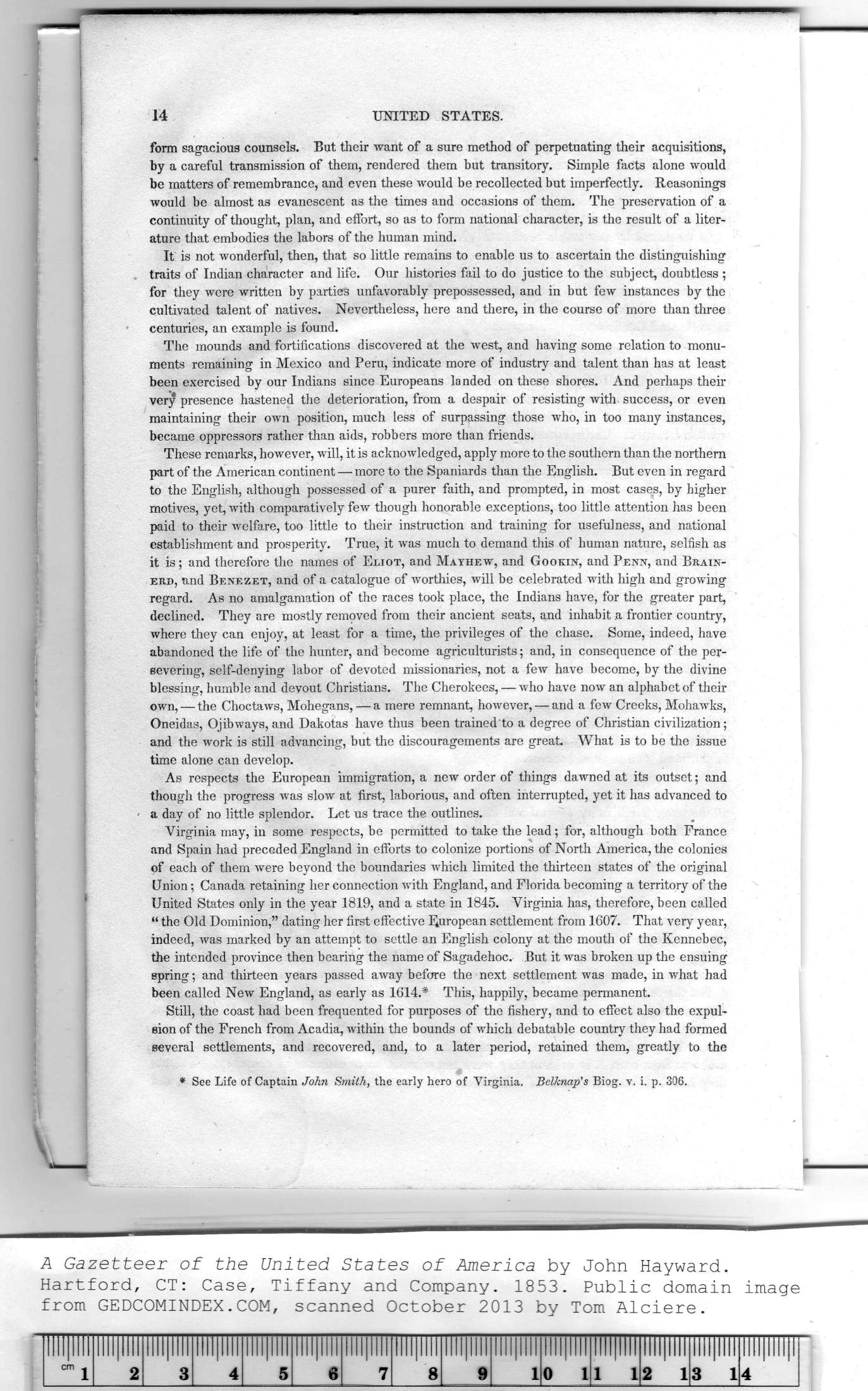|
|
Note: Ctrl and + increases the font size of the text below, Ctrl and - decreases it, and Ctrl and 0 resets it to default size.
14 UNITED STATES.
form sagacious counsels. But their want of a sure method of perpetuating their acquisitions,
by a careful transmission of them, rendered them but transitory. Simple facts alone would
be matters of remembrance, and even these would be recollected but imperfectly. Reasonings
would be almost as evanescent as the times and occasions of them. The preservation of a
continuity of thought, plan, and effort, so as to form national character, is the result of a liter-
ature that embodies the labors of the human mind.
It is not wonderful, then, that so little remains to enable us to ascertain the distinguishing
traits of Indian character and life. Our histories fail to do justice to the subject, doubtless ;
for they were written by parties unfavorably prepossessed, and in but few instances by the
cultivated talent of natives. Nevertheless, here and there, in the course of more than three
centuries, an example is found.
The mounds and fortifications discovered at the west, and having some relation to monu-
ments remaining in Mexico and Peru, indicate more of industry and talent than has at least
been exercised by our Indians since Europeans landed on these shores. And perhaps their
very presence hastened the deterioration, from a despair of resisting with success, or even
maintaining their own position, much less of surpassing those who, in too many instances,
became oppressors rather than aids, robbers more than friends.
These remarks, however, will, it is acknowledged, apply more to the southern than the northern
part of the American continent — more to the Spaniards than the English. But even in regard
to the English, although possessed of a purer faith, and prompted, in most cases, by higher
motives, yet, with comparatively few though honorable exceptions, too little attention has been
paid to their welfare, too little to their instruction and training for usefulness, and national
establishment and prosperity. True, it was much to demand this of human nature, selfish as
it is; and therefore the names of Eliot, and Mathew, and Gookin, and Penx, and Brain-
erd, and Benezet, and of a catalogue of worthies, will be celebrated with high and growing
regard. As no amalgamation of the races took place, the Indians have, for the greater part,
declined. They are mostly removed from their ancient seats, and inhabit .a frontier country,
where they can enjoy, at least for a time, the privileges of the chase. Some, indeed, have
abandoned the life of the hunter, and become agriculturists; and, in consequence of the per-
severing, self-denying labor of devoted missionaries, not a few have become, by the divine
blessing, humble and devout Christians. The Cherokees, — who have now an alphabet of their
own, — the Choctaws, Mohegans, — a mere remnant, however, — and a few Creeks, Mohawks,
Oneidas, Ojibways, and Dakotas have thus been trained to a degree of Christian civilization;
and the work is still advancing, but the discouragements are great. What is to be the issue
time alone can develop.
As respects the European immigration, a new order of things dawned at its outset; and
though the progress was slow at first, laborious, and often interrupted, yet it has advanced to
a day of no little splendor. Let us trace the outlines.
Virginia may, in some respects, be permitted to take the lead; for, although both France
and Spain had preceded England in efforts to colonize portions of North America, the colonies
of each of them were beyond the boundaries which limited the thirteen states of the original
Union; Canada retaining her connection with England, and Florida becoming a territory of the
United States only in the year 1819, and a state in 1845. Virginia has, therefore, been called
“ the Old Dominion," dating her first effective European settlement from 1607. That very year,
indeed, was marked by an attempt to settle an English colony at the mouth of the Kennebec,
the intended province then bearing the name of Sagadehoc. But it was broken up the ensuing
spring; and thirteen years passed away before the next settlement was made, in what had
been called New England, as early as 1614.* This, happily, became permanent.
Still, the coast had been frequented for purposes of the fishery, and to effect also the expul-
sion of the French from Acadia, within the bounds of which debatable country they had formed
several settlements, and recovered, and, to a later period, retained them, greatly to the
* See Life of Captain John Smith, the early hero of Virginia. Belknap's Biog. v. i. p. 306.
|
Illllllll |
Illllllll |
llll|llll |
Illllllll |
Illllllll |
llll|llll |
llll|llll |
llll|llll |
Illllllll |
llll|llll |
Illllllll |
Illllllll |
Illllllll |
Illllllll |
|
|
cm j |
2 |
3 |
4 |
5 |
6 |
7 |
8 |
9 |
1 |
0 1 |
1 1 |
2 1 |
3 1 |
4 |
|
